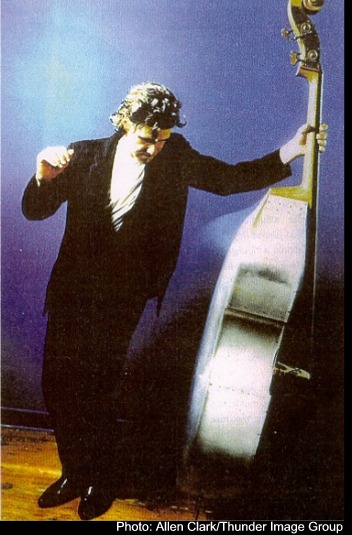
Sideman - Musician Magazine Bassics Magazine Bass Player Crosstalk - Music Connection Bass Notes - Bass Player Magazine Steady Rollin' by Bob Margolin - Blues Review Nightwatch - The Washington Post
Bass Player Crosstalk - Music Connection, March 1998
This veteran bassist has built his name up over the years, resulting in his work with
the Rolling Stones.
By Jonathan Widran
For Jeff Sarli, playing upright bass on three cuts:"Flip The Switch", "Too Tight"
and "How Can I Stop" - from The Rolling Stones' recent Bridges to Babylon album, was
the fulfillment of a lifetime dream. The veteran bassist, whose resume boasts equal
splashes of rockabilly, roots rock and delta blues, recalls that at age thirteen, the
first song he ever played with his first band was the Stones' "Satisfaction".
"We called ourselves Money Back Guarantee," laughs Sarli, who has since gone on to jam
with the likes of Marshall Crenshaw, The Band, Bob Margolin (from Muddy Waters' group) and
Commander Cody guitarist Bill Kirchen. "We had two guitars, which was my first instrument,
drums and an accordion player whose mother let us rehearse at his house. After we played
that song, I fantasized what it might be like to play with the Stones."
Sarli would have to wait a few years for that dream to come true. Recording with guitarist
John Mooney and Bluesiana (the band is preparing to tour this year), Sarli bonded with the
project's drummer, George Recile, and producer Rob Fraboni, both of whom had just worked with
Keith Richards on his solo album. Fraboni was so impressed with Sarli's ability on both
electric and acoustic bass that he invited him to meet the Stones in Connecticut.
Sarli recalls the impromptu jam session, saying, "We turned on the tape machine and recorded
some great stuff. It just felt really comfortable. Keith said that kind of thing is rare for him,
too, because usually the Stones sit in the studio for months before committing anything to tape.
He brought up his interest in maybe doing a whole project of cover tunes he's played live by
himself, but then when Bridges to Babylon came up, he got sidetracked."
Months later, when Frabroni was tapped to record tracks on the project, Sarli got the surprise
call - Richards wanted to that upright bass flavor on those three tracks. Unable to find a suitable
cargo case for the huge upright, Sarli bought an extra first class ticket to take the instrument on
the plane from his hometown in Baltimore to L.A. - even getting frequent flier mileage credit for it!
Sarli spent a lot of days just hanging at Ocean Way and jamming informally before being tapped for
the tracks.
"It was a very loose situation." Sarli says. "Keith had very specific ideas for me. He didn't
want straight eights, he preferred a Dixon type feeling with more syncopation and cutting time in
half, like the bass you hear on those old Chuck Berry recordings. Keith would sing the lines to me
and tell me to just do what I do best. It wasn't till after each session, when I got back to my
hotel, that I thought, Oh my God, I'm jamming with the Stones!"
A restless sort who is committed to following muses, Sarli's motto is live it, learn it and move
on. "I have a habit of playing with a band for a few years - each time pushing myself to explore
new styles - and then moving on. It's not that I get bored, it's just that there is so much to learn.
"I'm not sure where that spirit comes from," he admits. "I think I'm just committed to learning
more about myself and growing as a player. I guess I don't want to be locked into any specific
lifestyle or music. I feel comfortable in a lot of situations."
No matter the situation Sarli gravitates to, his basic approach to the bass remains simple.
"Virtuosity has its place, don't get me wrong," he explains, "but with me, people figure they are
going to get something else instead of that genius touch. Something solid, simple, nothing too
intense, but that feels really good. Not everyone wants to hear a bassist explore the upper
register, walking lines all over the place, because some situations just call for a sound that's
raw, fat and loud. Part of that is my natural affinity for roots music, where bass solos aren't
encouraged. It's more about keeping the flow going, swinging in more subtle, less obvious ways.
To me, the best thing a bass player can do is be so effective that he goes largely unnoticed."
| 
